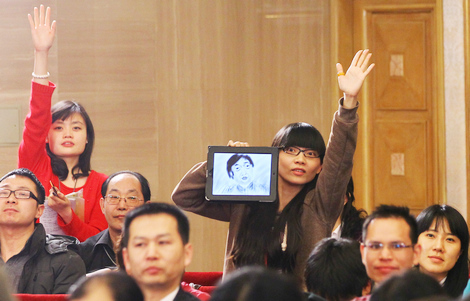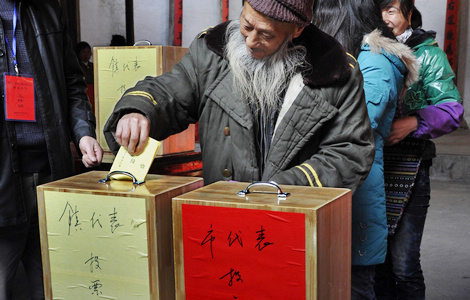 |
|
|
|
|||||||||
China's Guizhou province is home to 17 different ethnic groups. Their culture and the province's intriguing landscapes have long been regarded as treasures.
Earlier this year, the central government encouraged the province to develop its cultural resources for tourism.
"The central government has pointed out a way for us to utilize our comparative advantages in ethnic culture and tourist resources," said Li Zhanshu, party secretary of Guizhou province at a press conference held in Beijing yesterday during the annual sessions of the National People's Congress and the Chinese People's Political Consultative Conference.
The province will further explore its "original, diverse and harmonious" ethnic culture, and build a series of competitive tourist destinations, Li said.
Tourism brought 170 million yuan ($26.9 million) in revenues for Guizhou in 2011.
"We have made full use of our advantages in ethnic culture and created a series of special cultural attractions," Li said.
He cited as an example, Wind of Colorful Guizhou, a stage performance of traditional dance, songs, and customs of more than a dozen ethnic minority groups.
Since it was registered as the first provincial cultural brand, the show has been promoted in more than 300 cities around China and in more than ten countries in Asia, North America and Europe. It is expected to bring in 150 million yuan in box office receipts.
This year, the show was staged in New Zealand and Australia as a special project on the behalf of China's Ministry of Culture.
"All our overseas performances were successful and well received," said Jiang Wenjun, sales manager of the Wind of Colorful Guizhou Culture and Arts Company. "The show has become Guizhou's calling card and has helped foreigners know Guizhou much better."
Each tour abroad costs some 5 million yuan, mostly funded by the provincial government. It has promoted the province effectively and laid the foundation to further develop the show into a commercial venture, Jiang said.
For the present, cooperating with host companies abroad is a good choice, he said, as the company has only begun to think about making their show a commercial one.
"We must rely on the box office and follow the market in the future," Jiang said. "However, we still have to take into consideration many things."
Wu Ying, iPad, Jeremy Lin, Valentine's Day, Real Name, Whitney Houston, Syria,Iranian issue, Sanyan tourism, Giving birth in Hong Kong, Cadmium spill, housing policy

|

|

|

|

|

|